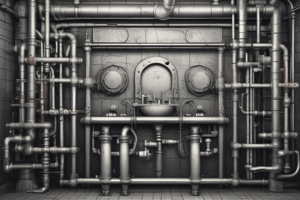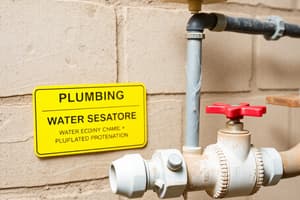Podcast
Questions and Answers
Substances that produce explosive mixtures are allowed to enter the building drainage system.
Substances that produce explosive mixtures are allowed to enter the building drainage system.
False (B)
A water closet can be located in a poorly lit and ventilated room.
A water closet can be located in a poorly lit and ventilated room.
False (B)
Plumbing systems are required to be maintained by Registered Master Plumbers.
Plumbing systems are required to be maintained by Registered Master Plumbers.
True (A)
Proper protection is not necessary to prevent contamination of materials by sewage backflow.
Proper protection is not necessary to prevent contamination of materials by sewage backflow.
Suitable provisions for sewage disposal are unnecessary if a sewer system is in the area.
Suitable provisions for sewage disposal are unnecessary if a sewer system is in the area.
Plumbing installations should consider the preservation of structural members.
Plumbing installations should consider the preservation of structural members.
All plumbing fixtures are required to be installed too close to each other for accessibility.
All plumbing fixtures are required to be installed too close to each other for accessibility.
Sewage can be discharged into waterways without any treatment.
Sewage can be discharged into waterways without any treatment.
All premises intended for human use must be provided with a supply of pure and wholesome water.
All premises intended for human use must be provided with a supply of pure and wholesome water.
Plumbing fixtures can be made of absorbent materials provided they are ventilated.
Plumbing fixtures can be made of absorbent materials provided they are ventilated.
Every building that has access to a public sewer system must connect its plumbing fixtures to that sewer.
Every building that has access to a public sewer system must connect its plumbing fixtures to that sewer.
Plumbing shall use the maximum quantity of water for optimal performance.
Plumbing shall use the maximum quantity of water for optimal performance.
Vent terminals must extend to the outer air and be designed to prevent the return of foul air to the building.
Vent terminals must extend to the outer air and be designed to prevent the return of foul air to the building.
Devices for heating and storing water should be installed to encourage overheating.
Devices for heating and storing water should be installed to encourage overheating.
Each family dwelling unit must have at least one water closet and two sinks.
Each family dwelling unit must have at least one water closet and two sinks.
The drainage system must include adequate cleanouts to facilitate easy cleaning of pipes.
The drainage system must include adequate cleanouts to facilitate easy cleaning of pipes.
Flashcards are hidden until you start studying
Study Notes
Basic Principles of Plumbing Code
- Premises must have a supply of safe, clean water, protected from unsafe sources and backflow.
- Sufficient water volume and pressure are required for plumbing fixtures to operate effectively and quietly.
- Plumbing design should minimize water use while ensuring proper performance and cleaning.
- Water heating and storage devices must be designed to prevent explosion hazards from overheating.
- Buildings adjacent to public sewers must connect their plumbing fixtures to the sewer system.
- Family dwellings must include at least one water closet, kitchen sink, lavatory, and bathtub or shower for sanitation and hygiene.
- Plumbing fixtures should be smooth, non-absorbent, free from hidden fouling surfaces, and installed in ventilated areas.
- Drainage systems must be designed to prevent fouling, solid deposits, clogs, and must have accessible cleanouts for maintenance.
- Piping materials must be durable, approved, and installed by registered professionals to ensure reliability.
- Each drainage-connected fixture must have a water-sealed trap to prevent sewer gases from entering the building.
- Drainage piping must allow air circulation without causing siphonage or loss of trap seals during normal use.
- Vent terminals should reach open air to prevent clogging and return of bad air into the building.
- Plumbing systems must undergo tests to identify leaks and defects effectively.
- Prohibit entry of substances that might clog pipes, create explosive mixtures, damage pipes, or disrupt sewage disposal.
- Safeguards against sewage backflow contamination are necessary for food and water safety, including indirect connections to drainage.
- Water closets must be in well-lit and ventilated rooms.
- Areas without a sewer system must implement accepted sewage disposal methods, such as septic tanks.
- Systems at risk of sewage backflow require measures to prevent overflow inside the building.
- Registered Master Plumbers are responsible for maintaining plumbing systems in good condition.
- Proper spacing ensures all plumbing fixtures are accessible for their intended functions.
- Plumbing installation must maintain the structural integrity of buildings and prevent damage to walls and surfaces during usage.
- Sewage and harmful waste must not enter ground or waterways without proper treatment to neutralize pollutants.
Studying That Suits You
Use AI to generate personalized quizzes and flashcards to suit your learning preferences.




